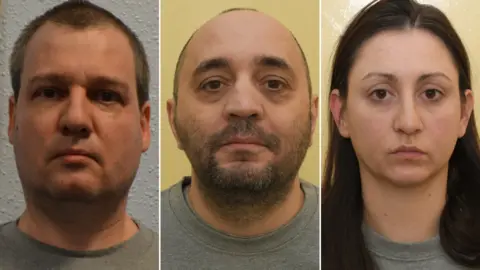In May 2016, three individuals from Bulgaria, later convicted for espionage activities on behalf of the Russian government, were attendees at an event held in the historic Palace of Westminster, the seat of the UK Parliament. This gathering, which focused on discussions surrounding Brexit, was scrutinized in a comprehensive investigation conducted by BBC News. The present spies included Orlin Roussev, Biser Dzhambazov, and Katrin Ivanova, whose involvement has now raised significant concerns regarding parliamentary security and foreign infiltration into UK politics.
The event in question had high-profile sponsors, including former West Ham MP Lyn Brown, now known as Baroness Brown of Silvertown. Despite the serious nature of the allegations surrounding the three convicts, Baroness Brown expressed no recollection of meeting them during the event. The parliamentary spokesperson confirmed that while security measures are robust, Parliament remains a public space, allowing for public access and hosting of events. However, this openness provokes debate about the adequacy of current security protocols, particularly after revelations that these individuals, who were deeply connected to a broader network of Russian espionage, could navigate a venue associated with government activities.
Photographic evidence obtained by the BBC illustrates that Roussev, Dzhambazov, and Ivanova mingled with various representatives from European political parties during the event. This suggests a calculated effort by the Russian spies to establish networking channels within the political sphere of the UK and Europe, further complicating the issue of parliamentary security. The extensive visibility of these individuals in social media posts highlights their overt participation at the gathering, raising questions about the vetting processes for attendees at such significant political discussions.
Two individuals, able to confirm Roussev’s identity at the Commons event, provided testimony to the BBC. This included visual verification of attendance by Dzhambazov and Ivanova. Importantly, their participation seems to have been facilitated under the pretext of legitimate political engagement, which could indicate that espionage activities are often cloaked in seemingly innocuous endeavors.
The involvement of the former Bulgarian Prime Minister Sergei Stanishev and other notable European Party leaders enhances the intrigue around this event. The Bulgarian Socialist Party (BSP), which underpinned some of the attendees’ political affiliations, claimed to represent a broad swath of political perspectives in the UK Parliament during the occasion. This echoed the issues raised about security and foreign influence, underlining the potential vulnerability of parliamentary events.
Following their attendance, Roussev, Dzhambazov, and Ivanova were implicated in a wider espionage operation aimed at undermining adversaries of Vladimir Putin’s regime, including investigative journalists and dissidents, revealing the grave implications of their espionage activities. Accomplished under the direction of Jan Marsalek from Russia, the trio’s actions included surveillance operations across Europe, which ultimately led to their confrontation with the law and convictions in early 2023.
Sir Iain Duncan-Smith MP, a prominent figure within Parliament, has called for a more comprehensive investigation into the ramifications of the spies’ attendance at the event, pressing the need to ensure that such infiltrations are prevented in the future. The backdrop to these calls is the established fear regarding the increased sophistication of foreign espionage tactics seeking to undermine the sovereignty of the UK.
The investigation undertaken by the BBC serves as a critical reminder of the challenges faced in safeguarding parliamentary integrity against espionage activities. With previous allegations concerning spies from various nations infiltrating political ranks, this case highlights the ongoing need for vigilance in maintaining security within the walls of the UK Parliament—a reminder of the delicate balance between transparency and security in a public institution.



